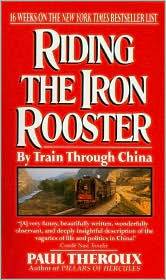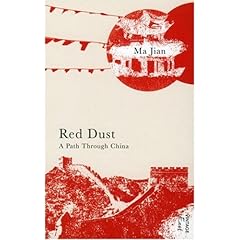Wild Swans by Jung Chang

"Wild Swans" is about 15 years old and has been a best seller. It's the true story of three generations of women living in China during the rise of the Chinese Communist party and Mao's Great Leap Forward and the later Cultural Revolution. The author's grandmother was the concubine of a military general. Their daughter, Jung's mother, married a communist and faced many years of struggling to be accepted in the Party. The author herself was a member of the Red Guard and witnessed many members of her community, including her parents, "criticized" quite severely. This book was a great way to learn about the extreme changes the country went through in less than a century.
Riding the Iron Rooster by Paul Theroux

I am a huge fan of Paul Theroux. He's a great travel writer and especially likes to write about train travel. Riding the Iron Rooster is about his extensive train travel through China in the 1980s, after the fall of Mao. He talks to a lot of locals and compares his trip with one he took through the country two decades earlier.
Red Dust by Ma Jian

This is a very different book from the others I read (though I'm not completely done with it). Also nonfiction, Red Dust was originally written in Chinese. It's a personal narrative of a man's journey through his motherland in the early 1980s. During the Cultural Revolution, as an artist, Ma definitely would have been called bourgeois during the cultural revolution, but even after, he was seen as a person of questionable character. He decided to leave his job in Beijing and set off to see China. It's a nice contrast with Theroux's experience as a total outsider at the same time.
China, Inc. by Ted Fishman

China, Inc., is the most-recently published book I have read, and perhaps the most important. It highlights the transformation China has made since the end of the Cultural Revolution, toward industrialism and its own brand of capitalism. In a land where the government once owned virtually everything, China is now teaming with small and large business owners. In fact, towns and cities become known for one thing, because when one business takes off (say, umbrella manufacturing), dozens of copycats spring up in no time. The book explores not only this transformation, but also how it affects America's economy, from job outsourcing to the cost of our products to Wal-Mart's role in the whole thing. Very enlightening.
Thanks to these four books, I've been able to see how China has transformed from a dynasty-run society at the beginning of the 19th century, through Maoism and onto capitalism in just over a century. I feel much more prepared to experience this new and exciting culture--one that most of us simply don't take the time to understand.



1 comment:
Justin - Emily told me to check out your blog to learn more about your trip to China. How exciting! If you are looking for another book, I would recommend "Spider Eaters" by Rae Yang. I read it for a Chinese history class at TCU - very interesting and moving. Have a great time!!!
Meg Bothe
Post a Comment